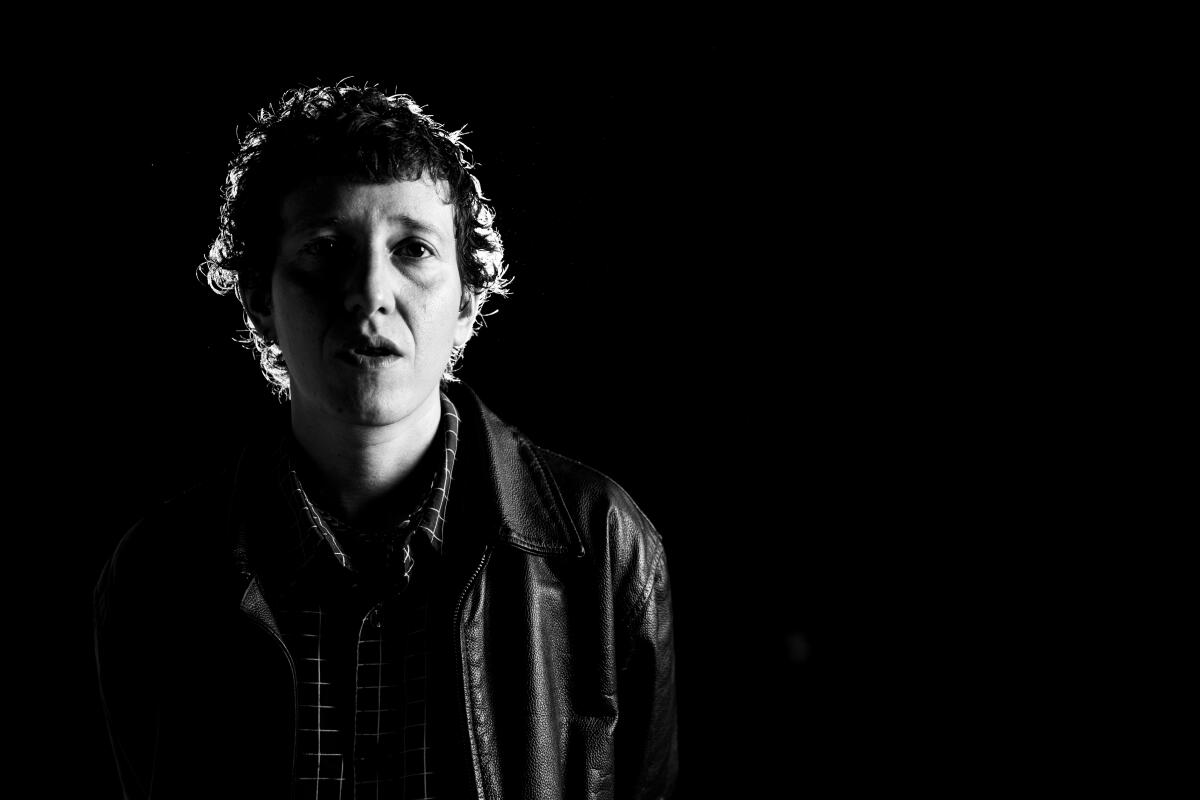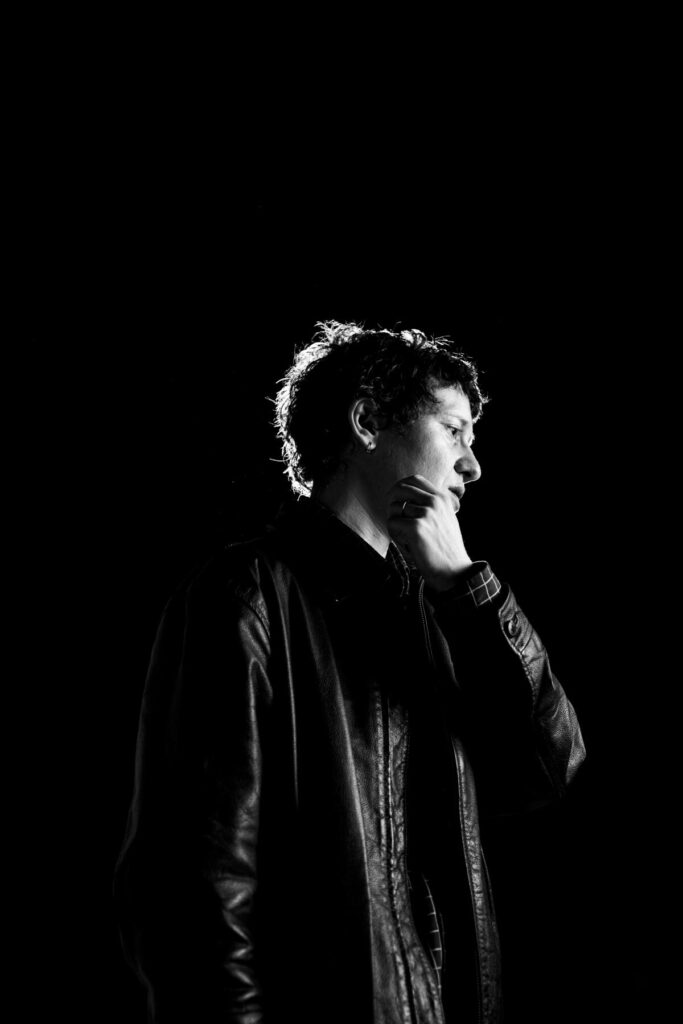Once upon a time, Mica Levi said hello to the world through the hose of a vacuum cleaner.
As a founder of the English pop group Micachu and the Shapes, Levi strummed a tiny, detuned thrift-store guitar and sang fragmentary songs in which laptop samples collided with real industrial objects, like the vacuum that Levi would use to lower their voice “and sort of sound satanic,” they explain.
“It was definitely bad for me,” Levi says. “Knocked off maybe a couple of years. But, you know, all in the name of art.”
Levi — droll, British, nonbinary — has carved out a fittingly outré musical trajectory, going from the London underground, where Björk and the Flaming Lips were among early fans, to true renegade credibility as one of the most daring and sui generis composers in film. Their latest achievement, the score for Jonathan Glazer’s “The Zone of Interest,” (in theaters Friday), is both impossible to describe and inextricable from the film’s morbid power.
Musician and composer Mica Levi, photographed at Quixote West Hollywood Studios in December.
(Annie Noelker / For The Times)
This, despite the fact that there’s very little of it in the movie. The vast majority of “Zone,” which documents the quotidian family life of a German man — who lives in an idyllic garden on the other side of the wall from Auschwitz, where he is camp commandant — has no score other than a few punctuations of an alien-sounding vocal effect. But the movie is bookended by Levi’s contributions, opening in complete blackness and an oozing sound bath of warped voices and synthesizers, and concluding with a six-minute audio train ride through hell.
“He’s not worried or frightened of anything,” says Levi of Glazer, both a collaborator and a friend. “It’s sort of like: You’ve got an opportunity. Don’t f— waste it.”
Asked how he elicited this particular score from Levi, the director is as enigmatic as his film. “I can never remember where or how we start,” Glazer says via email. “It’s really just an ongoing conversation. Like taking a nice long walk together.”
Levi, 36, is in Los Angeles to do some limited promotion for the film, and has just survived several post-screening Q&As, a nightmare for an introvert who doesn’t love to gab. Levi isn’t meek, per se, but they have the slightly nervous disposition of a bird caught in a house, absentmindedly twirling their brown curls and mostly avoiding eye contact. In a brown industrial work shirt, blue jeans and thick black boots, Levi rolls a homemade cigarette following our interview like they earned a smoke break after a difficult shift.
We meet in a small studio in West Hollywood, bustling with publicists and film crews and craft services. Levi, with their workwear outfit and southern English accent, seems as out of place in this showbiz environment as Scarlett Johansson’s bombshell alien did in the far reaches of Scotland in “Under the Skin,” Levi’s film-scoring debut. The musician suggests we escape to the unglamorous park across the street, where we sit on some dirty bleachers in the hot December sun as dogs chase Frisbees and children babble on a nearby swing set.
Levi has always found comfort where most people are uncomfortable. Born to musicians — their mother was a cello teacher and their father, Erik, a pianist and respected scholar of Third Reich-era music — Levi grew up in the London suburb of Surrey, often feeling like an outsider. They played violin and attended the prestigious Purcell School as a kid, turning up on the first day in a football uniform complete with shin guards.
Levi watched Disney movies and rom-coms growing up, and even tried writing “fake Romantic” orchestral music, but as a teenager got turned on to the eccentricities of Captain Beefheart and the Californian composer Harry Partch. A gay man who lived during the Great Depression, sometimes without a home, Partch broke ranks with the established pitch system prescribed in Western classical music. “It’s kind of like things have been nipped and tucked to fit the piano,” Levi says, “and he was looking for freedom.”
For the record:
10:17 a.m. Dec. 13, 2023A previous version of this article referred to Mica Levi as Cockney. They are southern English.
Partch was also a carpenter and built his own instruments, allowing him to express music outside of the 12 standard tones, a clear precursor to Levi’s work.
“A lot of the music that I like,” Levi says, “the people who make it — there’s something in their spirit that I resonate with.”

Musician and composer Mica Levi, photographed at Quixote West Hollywood Studios in December.
(Annie Noelker / For The Times)
Levi started making loops in the sequencer Logic and got into London’s grime electronica scene, DJing and making mixtapes. While studying composition at the Guildhall School of Music and Drama, they decided to form a band: Micachu was a Pokémon reference, and the Shapes were Levi’s Guildhall schoolmates, keyboardist Raisa Khan and drummer Mark Pell. Dropping out of university, Levi found a promoter in Matthew Herbert, an English electronic musician and producer who specialized in sampling everyday objects, and the band released their startling debut album, “Jewellry,” in 2009 to high praise.
The Boston Globe declared Levi “one of the brightest brains on the brink of pop,” and the album led to festivals and tours as well as commissions from London orchestras. Was it pop, though? Levi claimed so at the time, but today, it’s a different matter. “I was just being antagonistic,” they say. “I don’t think it is pop.”
Whatever it was, Levi was casually twisting the ears of both pop and classical and creating a sickly beautiful language of their own, one that caught the attention of fellow Brit Glazer. Originally a music-video auteur for groups like Radiohead and Blur, Glazer had already directed 2000’s “Sexy Beast” and 2004’s “Birth,” and was making his alien art-house picture “Under the Skin,” his first movie in what would be nine years. He wanted music by a newcomer.
When Levi interviewed for the job, the 26-year-old felt they had as good a chance as being hired as the CEO of a bank. “But I think that kind of helped me get the gig,” Levi says, “because I went in with no nerves. It was a really life-changing experience.”
Soon audiences around the world heard a new universe — a wasp’s nest of shivering strings, an eerily sensual siren song — that announced a major arrival in film scoring. Levi followed Glazer’s instructions to try to get inside his beautiful alien’s head and growing heart, but in some ways they just wrote music that sounded good.
“A lot of the time when I’m making music, I’m just making music,” Levi says. “I’m not looking at any screen pictures or anything like that. Jon told me at that time, ‘Carry on making what you’re into.’”
In the meantime, Levi’s otherworldly star rose. Chilean director Pablo Larraín was a juror at the Venice Film Festival, where “Under the Skin” premiered, and was immediately smitten. He felt that if Levi had been born a few generations earlier, they “would be in the record store next to Mendelssohn or Stravinsky,” Larraín told me in 2016.
The filmmaker hired Levi for “Jackie,” his Natalie Portman-led biopic of Jacqueline Kennedy during the days after her husband’s assassination, which Levi scored with a kind of drunken sweetness and sudden waves of grief, again tampering with pitch and strings bending in unison. The score earned an Oscar nomination and Hollywood buzz, but Levi has been choosy, turning down offers and working with just a handful of iconoclastic filmmakers on mostly dark subjects.
For “Monos,” the 2019 import by Colombian Ecuadorean director Alejandro Landes about a guerrilla child army, Levi created a recurring motif by blowing into a bottle on a recording that also captured some random birdsong. Levi followed that with a lean score for the “Mangrove” chapter of Steve McQueen’s film series, “Small Axe,” then did some skittering, damaged beats for “Zola,” Janicza Bravo’s 2020 adaptation of a Twitter thread about a stripper’s road trip to Florida.
Levi remained close with Glazer, lending some ghostly music to the director’s 2019 short film “The Fall” and a club-worthy track to his 2020 choreographed short, “Strasbourg 1518.” All the while, Glazer was telling Levi about his adaptation of the Martin Amis novel “The Zone of Interest,” about Nazi officer Rudolf Höss. His take would turn out to be a close-captioned-TV-style chronicling of the banality of industrialized genocide.

A scene from the movie “The Zone of Interest.”
(A24)
Levi worked in Glazer’s London studio for an entire year, hand in hand with picture editor Paul Watts and sound designer Johnnie Burn, and initially wrote hours of warm, almost romantic music for the Höss family.
But it acted like “morphine for the viewer,” Burn remembers. “It just was made to make you feel better — and it really did. Listening to it in isolation, it would make anyone feel great. But it did such an unusual thing to the images.”
Glazer recalls that any kind of music simply “slid off” the images. Burn adds that, “because the images are so documentary, it had an effect, at times, of saying, ‘This didn’t really happen,’ because it’s become sweetened or dramatized by the music.”
So Levi’s score was jettisoned and Burn’s faint but vivid soundtrack of the unseen horrors going on over the fence was all that remained.
The music Levi wrote for the black-screen prologue, though, somewhat related to the warm family score, stayed, serving as a descent for the audience into the story of this family, and, says Glazer, “to communicate the idea of: Ears first.”
Levi took the “forevery, primordial” sound of human voices (as they put it) and manipulated them with modern technology. They did the same for a series of what they call the “yums” — deep, robotic belches — that occur when Glazer switches to thermal imagery of a resistance fighter collecting apples in the night. The only other music in the film accompanies a series of images of flowers that turns into a glowing red screen, and this “gungy little sound comes on,” says Levi. “We called them zits.”
After Glazer’s film cuts to black at the end, the music reemerges in a nightmarish march of yawping voices. Levi recorded a group of singers making different shrieks and whoops, then constructed a collage from them that slowly, gradually descends in pitch.

Musician and composer Mica Levi, photographed at Quixote West Hollywood Studios in December.
(Annie Noelker / For The Times)
“It’s literally that basic,” Levi says. “Really, like, A-B-C.”
The effect, particularly in the wake of Glazer’s movie, is shattering but also open to the ear of the beholder. To Emile Mosseri, the Oscar-nominated composer of “Minari,” Levi’s work is “the most f— up music you’ve ever heard — beautiful and cathartic in how it delivers the horror you’ve been self-generating the whole film.” To Glazer, it’s “alarm bells, walls shaking, a call to arms, a surfacing.”
Are these the voices of the victims or the hell-bound damned who murdered them? Levi doesn’t intellectualize it like that, doesn’t have a straightforward intention.
“I think they’re really confusing, emotionally,” Levi says. “I don’t understand the movie.”
Given what Mica Levi does so arrestingly, that may not be necessary.

